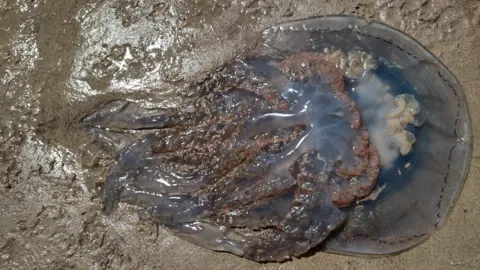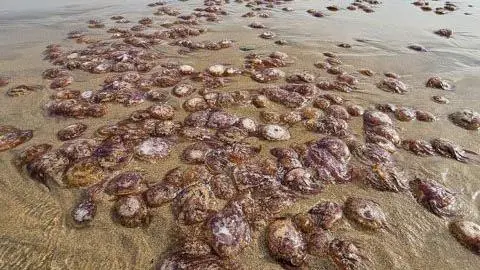Hundreds of jellyfish wash up on Cornish coast
 Joyce Edmunds
Joyce EdmundsBeachgoers have been asked to report marine strandings after numerous jellyfish washed up on a beach in Cornwall.
Hundreds of barrel jellyfish, also known as dustbin-lid jellyfish due to their size, were counted at Perranporth last month.
Cornwall Wildlife Trust said it was also seeking photo submissions to its Marine Strandings Network, which collates information on the environment and health of marine creatures.
Dr Dan Barrios-O'Neill said the influx of jellyfish was "normal in the grand sweep of time" but there were questions to be asked about whether there were "more blooms, more often".
'Fundamental to ecosystems'
He said: "People tend to view them as these pests and if we see more of them something's going wrong, but we're discovering more and more jellyfish are fundamental to marine ecosystems.
"So many things eat them, they provide habitat and shelter for juvenile fish and they're this amazing biological pump swimming up and down in the water introducing nutrients into the surface layers.
"This allows plankton to grow and gives rise to fish and seals and dolphins and all the things we love so much in Cornwall."
Dr Barrios-O'Neill said stings from barrel jellyfish, which have also recently washed up at places including Daymer Bay and Watergate Bay, were "very mild" due to their lack of "proper tentacles".
"Most of our jellyfish in this part of the world don't give you particularly painful stings or any stings at all, we're talking nettles or less," he said.
"If you see one when snorkelling, just enjoy it because they're amazing animals, they have a lava-lamp type quality which is just mesmerising.
"A little bit more problematic, you've got the mauve stingers, which we saw loads of last autumn.
"They're not particular dangerous but they are more painful," he added.
 Andy Penny
Andy PennyDr Barrios-O'Neill said warming seas could lead to a reduction in jellyfish.
He said: "If the phytoplankton at the bottom decline by about 16% that would lead to a 40% decrease in the amount of fish, jellyfish, crustaceans and everything else at the middle to the bottom of the food web."
The Head of Marine Conservation asked for beachgoers to report any strandings to the charity's Marine Strandings Hotline or online.
The project has been recording and monitoring dead marine wildlife strandings in Cornwall and the Isles of Scilly for 20 years.
The charity said: "This gives us an understanding of the threats marine wildlife are facing, so we can campaign for changes to manage and mitigate these threats."
Follow BBC Cornwall on X, Facebook and Instagram. Send your story ideas to [email protected].
